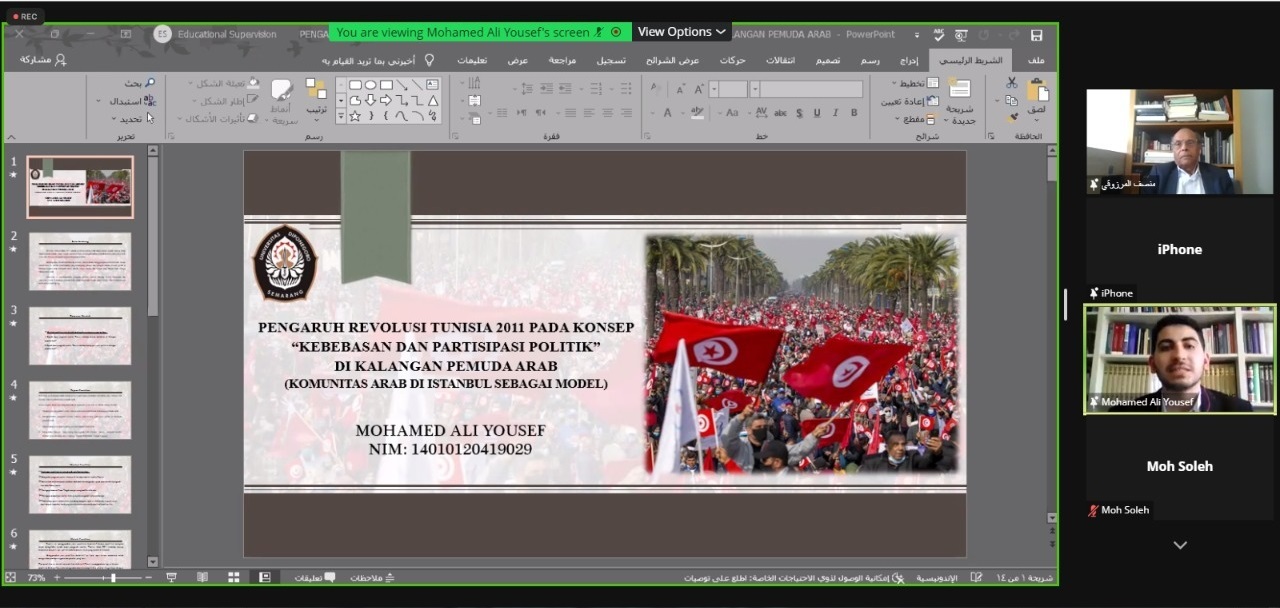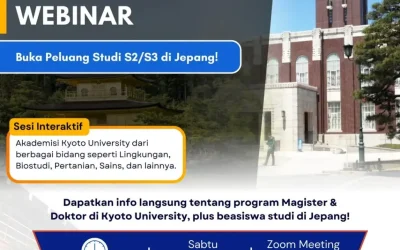DPIP-Semarang– It is common for the Master of Political Science (MIP) Study Program to hold a thesis exam. After all, since its establishment in 2004, this study program has graduated as many as 310 students. However, this thesis examination was very special because the guest examiner was the 4th President of Tunisia, namely Dr. Moncef Marzuki. Through the Zoom application, President Moncef also examined a MIP student, Mohamed Ali Yousef with a thesis entitled “The Effect of the 2011 Tunisian Revolution on the Concept of Freedom and Political Participation among the Arab Youth: Arab Community in Istanbul as a Model.” The exam was held on Wednesday, June 29th, 2022 at 7:00 PM GMT+7.
The thesis theme raised by Mohamed Ali Yousef related to Tunisian Jasmine Revolution in 2010. This revolution was triggered by political upheaval and the Tunisian people’s resistance to President Zine al-Abidin Ben Ali who was despotic, dictatorial, and corrupt, as well as committed human rights violations. This revolution itself was also triggered by the self-immolation of a young man named Muhammad Bouzizi, as an expression of his despair against the political repression and injustice of the Ben Ali regime. This self-immolation evoked the spirit of resistance of the Tunisian people and succeeded in overthrowing the authoritarianism of the Ben Ali regime which had served for 20 years.
In his thesis, Ali Yousef stated that the Jasmine Revolution had a domino effect on the revolutionary movement in several countries in the Middle East and North Africa. From the Jasmine Revolution, the Egyptian Revolution that demanded democratization in Egypt emerged against the Hosni Mubarak regime, there was also the Libyan people’s resistance to the authoritarian regime of Moammar Gaddafi who had led Libya for 34 years. In addition, there was the Yemeni Revolution which ended President Ali Abdullah Saleh. The Jasmine Revolution also inspired a wave of revolutions in Algeria—Tunisia’s neighbour country. The Bouteflika regime, which had led for 20 years, was impeached through the Algerian people’s revolutionary movement. Lastly, the Jasmine Revolution also ignited the spirit of the Bahraini people to overthrow the Al-kHalifa dictator. This series of revolutionary waves in the Middle East and North Africa—by Ali Yousef—was referred to as the Arab Spring between 2010 and late 2011.
As a thesis examiner, the Former President, Dr. Moncef Marzuki, asked various questions about the Jasmine Revolution. “The great contribution of the Tunisian Jasmine Revolution is the freedom and political participation of the Tunisian people, including the youth. Perhaps what is most striking about the Tunisian revolution is that it was a leaderless revolution, and was not pre-planned, nor had any directed ideological orientation, but a spontaneous event that resulted from mass solidarity with the young Bouazizi who was humiliated until he decided to lay down his life. This is what makes the Tunisian revolution unique among revolutions and requires a more serious scientific study,” replied Ali Yousef, a citizen of Turkey who lived in Egypt and took this case study in Algeria, convincingly.
Head of the Master of Political Science Study Program at Universitas Diponegoro, Dr. Laila Kholid Alfirdaus, who was also one of the three examiners, stated that Ali Yousef was an Egyptian student living in Turkey and a participant in the Diponegoro Master Scholarships (DIMAS) program. “That is why one of the respondents’ considerations taken by Ali Yousef in his thesis measures the influence of the Tunisian revolution on the concept of freedom among members of the Egyptian Arab community in Istanbul, while the second questionnaire measures the extent to which the Tunisian revolution affects the concept of political participation among the Egyptian Arab community in Istanbul.”
According to the chairperson of the thesis supervisor, Dr. Muhammad Adnan, MA, Ali Yousef succeeded in convincing the examiners with the findings and the conclusion of the study that the Tunisian Revolution had greatly influenced the Arab youth’s concept of freedom and political participation and strengthened their belief in the need for liberation from tyranny, as well as made the youngsters aware of the political reality of their country and encouraged them to participate in political and community participation. In addition, the Jasmine revolution increased the confidence of Arab youth in their political rights and enabled them to wrest their rights out of the hands of their usurpers.
The second supervisor, Dr. Teguh Yuwono, M.Pol. Admin., also added that Ali Yousef in his research results also concluded that the influence of the Tunisian revolution was very deep and broad, because it covered all members of the study, according to all variables including age, education, and place of residence as well as socio-political influences, freedom, and political participation of Arab citizens. in Turkey. Besides President Moncef Marzuki, the other examiners were Drs. Yuwanto, Ph.D., and Dr. Nunik Retno Herawati.





0 Comments